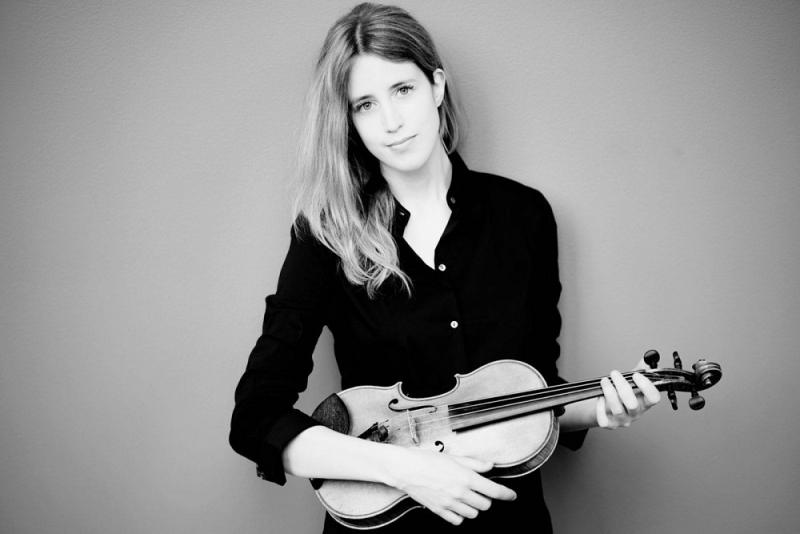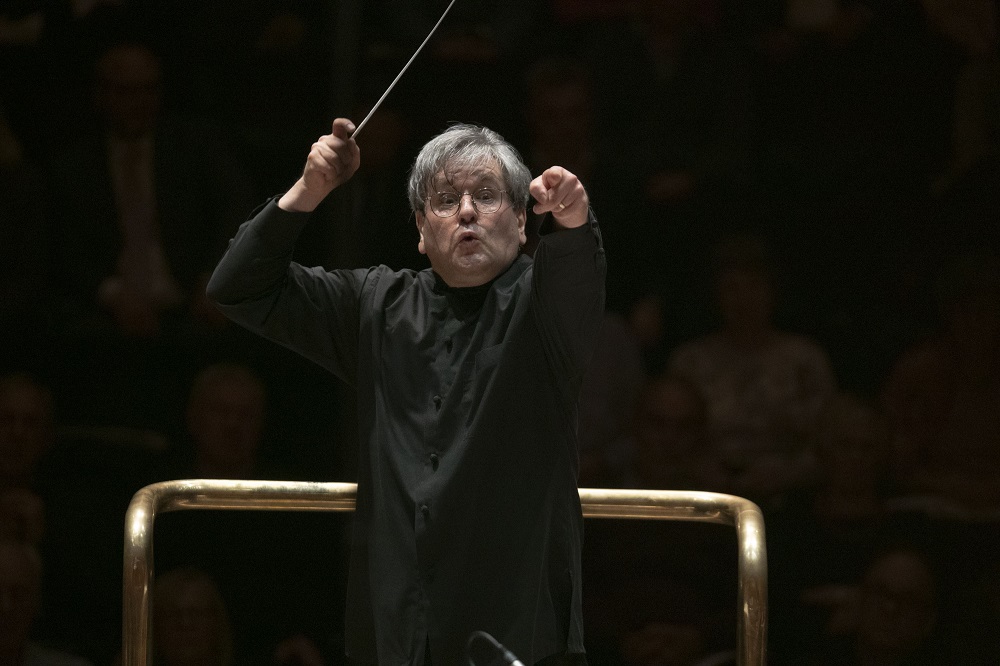Frang, LSO, Pappano, Barbican review - hearing the silence | reviews, news & interviews
Frang, LSO, Pappano, Barbican review - hearing the silence
Frang, LSO, Pappano, Barbican review - hearing the silence
A timely, daunting programme of three great works by Vaughan Williams and Britten

Three deep-veined masterpieces by two of the 20th century's greatest composers who just happened to be British, all fading at the end to nothing: beyond interpretations of such stunning focus as those offered by violinist Vilde Frang, conductor Antonio Pappano and the London Symphony Orchestra, these works could ask for nothing more than intense silence from the third point of what Britten called the magic triangle wi
We knew what to expect from Pappano's blistering but always lithe reading of Vaughan Williams's first howl of rage among his symphonies, the Fourth, back in December. That coincided with the anger and despair (for most in the audience, at any rate) of election night. Now here we are facing a temporary void, and all three works on the programme were surely in tune with our innermost feelings. The bedrock had to be VW's Fantasia on a Theme of Thomas Tallis, set in the Engish Hymnal (which the composer edited) to Addison's words "When, rising from the bed of death/O'erwhelmed with guilt and fear". Pappano grounded us and the LSO strings with just the right amount of objectivity in the singing rises and falls, the nine-player second ensemble placed upper stage/platform left and creating ethereal, distanced sounds by virtue of top chamber-musical technique. Nothing could have been more impressive than the articulation of the climactic phrase at the work's heart, cropping up again in the Sixth Symphony.
Pappano's way of getting hushed playing from an LSO on top form always seemed miraculousBritten's Violin Concerto was the pivot between the pure song of the Fantasia and the rhythmic violence of the sixth , perfectly poised between melodic writing for the soloist and startlingly-orchestrated tattoos, starting in the timpani with magically-wielded cymbal swishes. As Frang points out in a short but welcome programme interview, this work should absolutely be up there at the top of the 20th century violin-concerto tree with Shostakovich's two works in the genre, and yet programmers (she says) would always ask her to think about the Russian's First Concerto when she proposed the Britten.
Well, they are rebuked now by a violinist of supreme intelligence, one who holds the perfect Apollonian poise between passion and precision, alert in her slightly other-worldly way to what the orchestra is doing around her, miraculously attuned to the chamber-music she is sometimes asked to make with her fellow strings. In the dying fall after the many turns of the screw to Britten's passacaglia variations for the epic third movement, Frang took us on an out-of-body journey, never overdoing the major-minor oscillations which can sometimes seem self-pitying. The partnership with Pappano (pictured below by Liam Hennebry) and the orchestra was breathtaking, sometimes quite literally so.  So much of this work sounds like vintage Shostakovich filtered through Britten's stripped-down imagination that it's easy to lose sight of the fact that the symphonic masterpieces it seems to emulate were yet to come (Britten did knew Lady Macbeth of Mtsensk by the late 1930s, though the Fourth Symphony would not have reached him). By th mid-1940s Vaughan Williams would surely have been acquainted with Shostakovich's starkest mid-period masterpiece, the Eighth Symphony, and his own Sixth takes some of its shattering devices, only to parade them in a unique symphonic structure. The goose-stepping marches, a cor anglais lament, a scene of what feels like post-nuclear devastation: all are common to both works, but never, in VW, where you quite expect them. The biggest attack comes in the second movement; the desolation doesn't find resolution in an ambiguous finale,as in Shostakovich, but is that endgame. Distancing himself from suggesions that he was re-living the horrors of the Second World War, the composer suggested Prospero's "Our revels now are ended" for this pp, senza crescendo epilogue; I thought of Aschenbach's "What if all were dead, and only we two left alive?" in Myfanwy Piper's text for Britten's Death in Venice.
So much of this work sounds like vintage Shostakovich filtered through Britten's stripped-down imagination that it's easy to lose sight of the fact that the symphonic masterpieces it seems to emulate were yet to come (Britten did knew Lady Macbeth of Mtsensk by the late 1930s, though the Fourth Symphony would not have reached him). By th mid-1940s Vaughan Williams would surely have been acquainted with Shostakovich's starkest mid-period masterpiece, the Eighth Symphony, and his own Sixth takes some of its shattering devices, only to parade them in a unique symphonic structure. The goose-stepping marches, a cor anglais lament, a scene of what feels like post-nuclear devastation: all are common to both works, but never, in VW, where you quite expect them. The biggest attack comes in the second movement; the desolation doesn't find resolution in an ambiguous finale,as in Shostakovich, but is that endgame. Distancing himself from suggesions that he was re-living the horrors of the Second World War, the composer suggested Prospero's "Our revels now are ended" for this pp, senza crescendo epilogue; I thought of Aschenbach's "What if all were dead, and only we two left alive?" in Myfanwy Piper's text for Britten's Death in Venice.
Not that the meander is inexpressive: a solo oboe - the superb Juliana Koch - rises, wanly singing, and two aspirational chords surface; you want to hold on to them, but they, too, fade. Pappano's way of getting hushed playing from an LSO on top form always seemed miraculous, especially so in the eerie calm before the second-movement whirlwinds - unpredictable gusts of terror underpinned by unearthly double-bass tremolos. The first and third can sound overscored if lumpily handled; Pappano got a whiplash focus at the start and let the so-called scherzo batter so that the ultimate contrast was all the greater. This is a towering work that speaks, like its companions in a tough programme, to everything about our world today; the performers did it shattering justice.
Add comment
The future of Arts Journalism
You can stop theartsdesk.com closing!
We urgently need financing to survive. Our fundraising drive has thus far raised £49,000 but we need to reach £100,000 or we will be forced to close. Please contribute here: https://gofund.me/c3f6033d
And if you can forward this information to anyone who might assist, we’d be grateful.

Subscribe to theartsdesk.com
Thank you for continuing to read our work on theartsdesk.com. For unlimited access to every article in its entirety, including our archive of more than 15,000 pieces, we're asking for £5 per month or £40 per year. We feel it's a very good deal, and hope you do too.
To take a subscription now simply click here.
And if you're looking for that extra gift for a friend or family member, why not treat them to a theartsdesk.com gift subscription?
more Classical music
 Kaploukhii, Greenwich Chamber Orchestra, Cutts, St James's Piccadilly review - promising young pianist
A robust and assertive Beethoven concerto suggests a player to follow
Kaploukhii, Greenwich Chamber Orchestra, Cutts, St James's Piccadilly review - promising young pianist
A robust and assertive Beethoven concerto suggests a player to follow
 Robin Holloway: Music's Odyssey review - lessons in composition
Broad and idiosyncratic survey of classical music is insightful but slightly indigestible
Robin Holloway: Music's Odyssey review - lessons in composition
Broad and idiosyncratic survey of classical music is insightful but slightly indigestible
 Classical CDs: Wolf-pelts, clowns and social realism
British ballet scores, 19th century cello works and contemporary piano etudes
Classical CDs: Wolf-pelts, clowns and social realism
British ballet scores, 19th century cello works and contemporary piano etudes
 Bizet in 150th anniversary year: rich and rare French offerings from Palazzetto Bru Zane
Specialists in French romantic music unveil a treasure trove both live and on disc
Bizet in 150th anniversary year: rich and rare French offerings from Palazzetto Bru Zane
Specialists in French romantic music unveil a treasure trove both live and on disc
 Scottish Chamber Orchestra, Ibragimova, Queen’s Hall, Edinburgh review - rarities, novelties and drumrolls
A pity the SCO didn't pick a better showcase for a shining guest artist
Scottish Chamber Orchestra, Ibragimova, Queen’s Hall, Edinburgh review - rarities, novelties and drumrolls
A pity the SCO didn't pick a better showcase for a shining guest artist
 Kilsby, Parkes, Sinfonia of London, Wilson, Barbican review - string things zing and sing in expert hands
British masterpieces for strings plus other-worldly tenor and horn - and a muscular rarity
Kilsby, Parkes, Sinfonia of London, Wilson, Barbican review - string things zing and sing in expert hands
British masterpieces for strings plus other-worldly tenor and horn - and a muscular rarity
 From Historical to Hip-Hop, Classically Black Music Festival, Kings Place review - a cluster of impressive stars for the future
From quasi-Mozartian elegance to the gritty humour of a kitchen inspection
From Historical to Hip-Hop, Classically Black Music Festival, Kings Place review - a cluster of impressive stars for the future
From quasi-Mozartian elegance to the gritty humour of a kitchen inspection
 Shibe, LSO, Adès, Barbican review - gaudy and glorious new music alongside serene Sibelius
Adès’s passion makes persuasive case for the music he loves, both new and old
Shibe, LSO, Adès, Barbican review - gaudy and glorious new music alongside serene Sibelius
Adès’s passion makes persuasive case for the music he loves, both new and old
 Anja Mittermüller, Richard Fu, Wigmore Hall review - a glorious hall debut
The Austrian mezzo shines - at the age of 22
Anja Mittermüller, Richard Fu, Wigmore Hall review - a glorious hall debut
The Austrian mezzo shines - at the age of 22
 First Person: clarinettist Oliver Pashley on the new horizons of The Hermes Experiment's latest album
Compositions by members of this unusual quartet feature for the first time
First Person: clarinettist Oliver Pashley on the new horizons of The Hermes Experiment's latest album
Compositions by members of this unusual quartet feature for the first time
 Gesualdo Passione, Les Arts Florissants, Amala Dior Company, Barbican review - inspired collaboration excavates the music's humanity
At times it was like watching an anarchic religious procession
Gesualdo Passione, Les Arts Florissants, Amala Dior Company, Barbican review - inspired collaboration excavates the music's humanity
At times it was like watching an anarchic religious procession

Comments
This is a fine review of a
I was thinking at the time
I was thinking at the time that we might have until this coming weekend - not criticising at all the decisions to close early, though the Barbican still hasn't notified us about what it's doing - but even then I was aware of the extraordinary chiming with the time. But then all great, profound music is going to enrich us, or harrow us and hopefully take us out of the other side. Anyway, we all knew we were in the presence of absolutely phenomenal music making. This will feed us for quite some time to come.